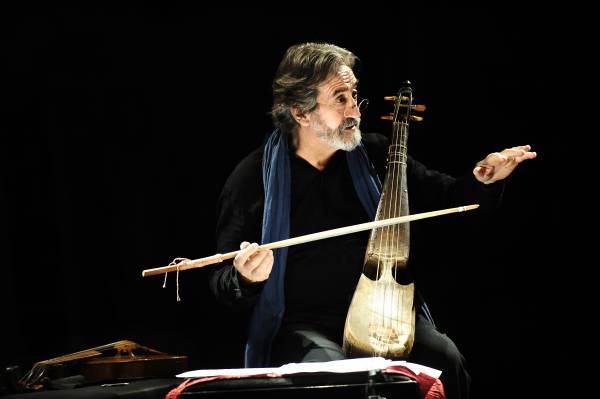
He may be the busiest musician alive, releasing around five new albums a year, and last year performing 145 concerts. Meanwhile Jordi Savall is in various stages of research and preparation for the host of forthcoming ancient, early, classical and world music projects that he releases in sumptuous editions on his own label, Alia Vox. He writes learned essays for the book-style liner notes, and even when the Spaniard takes a month-long holiday each Christmas he continues his daily practice on the viol, a Renaissance fretted string instrument (played with a bow), on which he is preeminent.
You can almost hear his shrug down the telephone line at being confronted with his own hyperactivity. “It’s hard work because you never stop,” he says, “but it’s beautiful… To play the viol is one of the great pleasures I have. The concert’s not work. I have work when I have to do the tax declaration, or when I have to pay the bills, like everybody.” He laughs gently at the thought that anyone could confuse play and work.
Savall’s extraordinary diversity sees him playing with Turkish musicians on one project, Balkan Gypsies on another; always learning and being inspired. “Then you come back home,” he says, “and you take your viol and you play Bach – Oh! My God, it’s nice! But it’s like when you are in love every day with the same person it becomes a routine also, but if you are away a week and then you come home, everything’s like a new start. It’s beautiful.”
Among his most acclaimed works is The Jerusalem Project, a musical history of that city told from Jewish, Christian and Muslim points of view. The commonality is the medieval period, when the musical language was largely shared by all. Savall sees the project as advancing cross-cultural understanding, and explains that the work’s roots lie in the history of Spain, the only European country in which Christians, Jews and Muslims cohabited.

“We [Savall and his late wife, the soprano Montserrat Figueras] said we have to record this spirit of these ancient times when Jewish people and Moorish people were together,” he recalls, “and through the music promote again a dialogue. And we discover then that the music is the only bridge that remains today with which it is possible to have a dialogue with Orient and Occident. Politically there’s no dialogue. Socially there’s no dialogue. It’s only through the music, and this is very important.”
It is especially relevant to The Jerusalem Project. “In some ways as long as no peaceful solution can be found for Jerusalem there will be no peace in the world,” he says.
In assembling people for his projects Savall has encountered musicians who could not contemplate working together: Armenians with Turks; Palestinians with Jews. But his manner suggests that he probably has a way of massaging players into more amenable states of mind. “Music,” he says, “can make us much more sensitive and much more open, and we can, I think, destroy barriers with the music – like the Jericho trumpets!”
He has been deeply fascinated by history and its lessons since childhood, and believes that music can provide unique insights. He points to the observations of the Bulgarian-born writer Elias Canetti “who says that music is a real, live history of humanity, because when we sing a song of the early times what we are doing is like a travel to this time, because the emotion of the song is the same. And then we perceive this passion in the moment.”
The Jerusalem Project: Joan Sutherland Theatre, Sydney Opera House, April 20.